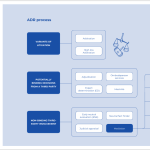Alternative Dispute Resolution (ADR) has gained global recognition as an effective method of resolving conflicts outside the courtroom. In Islam, the concept of ADR is deeply rooted in the Quran and Sunnah, offering timeless principles for achieving justice and harmony. This blog explores ADR through the lens of Islamic teachings, highlighting its Quranic foundations and relevance in modern times.
ADR in Islam: A Divine Approach to Conflict Resolution
Islam emphasizes the importance of peace, justice, and reconciliation. The Quran repeatedly calls for amicable resolution of disputes and encourages mutual understanding and compromise. The primary forms of ADR, such as mediation, conciliation, and arbitration, align with Islamic principles.
Key Quranic Teachings on ADR
- Reconciliation (Sulh)
The Quran explicitly endorses reconciliation as a means of resolving disputes. Allah says:
“And if two groups among the believers fight, make peace between them…”
(Surah Al-Hujurat 49:9)
This verse underscores the responsibility of mediators to promote reconciliation and restore harmony.
- Justice and Fairness
Justice is a cornerstone of Islamic dispute resolution. The Quran commands believers to uphold justice, even if it goes against their interests:
“O you who have believed, be persistently standing firm in justice…”
(Surah An-Nisa 4:135)
This verse highlights impartiality as a vital quality for mediators and arbitrators in ADR processes.
- Avoiding Litigation and Hostility
Litigation often fosters animosity, while ADR promotes peaceful settlements. Allah advises believers to avoid unnecessary disputes:
“And settlement is best…”
(Surah An-Nisa 4:128)
This verse encourages Muslims to seek amicable solutions rather than prolonging conflicts.
Prophetic Practice in ADR
The Prophet Muhammad (peace be upon him) exemplified ADR through his actions. He mediated disputes among tribes, encouraged forgiveness, and prioritized reconciliation. One notable example is the resolution of a dispute over placing the Black Stone (Hajr-e-Aswad) during the reconstruction of the Kaaba. The Prophet’s wisdom in involving all tribes to lift the stone together averted a major conflict.
ADR Mechanisms in Islam
Islam emphasizes resolving disputes amicably rather than in ways that foster hostility or enmity. This principle is deeply embedded in Islamic teachings, encouraging the use of Alternative Dispute Resolution (ADR) processes to address conflicts.
Islamic law provides a comprehensive framework for ADR, offering the following methods to settle disputes:
- Sulh: This includes negotiation, mediation, conciliation, and compromise to achieve a mutually acceptable resolution.
- Tahkim: Arbitration, where disputing parties appoint an arbitrator to make a binding decision.
- Med-Arb: A hybrid process combining sulh (mediation) and tahkim (arbitration), starting with reconciliation efforts and transitioning to arbitration if necessary.
- Muhtasib: The Islamic ombudsman, tasked with addressing grievances and ensuring justice in public matters.
- Informal Justice: Delivered by the wali al-mazalim (chancellor), focusing on addressing injustices and resolving disputes outside formal judicial processes.
- Fatwa by Muftis: Expert determinations based on Islamic jurisprudence, providing guidance to resolve conflicts in line with Shariah principles.
These ADR processes reflect the Islamic commitment to justice, fairness, and maintaining harmony within society while avoiding the adversarial nature of formal litigation.
- Mediation (Wasata)
Mediation involves a neutral third party helping disputants reach a voluntary agreement. The Quran supports mediation by advising intervention to foster peace:
“…Indeed, Allah loves those who act justly.”
(Surah Al-Hujurat 49:9)
- Arbitration (Tahkim)
Arbitration is a binding process where parties appoint an arbitrator to decide the outcome. The Quran mentions arbitration in the context of marital disputes:
“If you fear a breach between them, appoint an arbitrator from his people and an arbitrator from her people…”
(Surah An-Nisa 4:35)
- Conciliation (Sulh)
Sulh focuses on compromise and mutual satisfaction. The Prophet encouraged conciliation, stating:
“Reconciliation between people is more virtuous than voluntary fasting, prayer, and charity.”
(Sunan Abi Dawood 4919)
Relevance of Islamic ADR in Modern Times
Islamic ADR offers solutions that are adaptable to contemporary conflicts. Its emphasis on fairness, neutrality, and mutual consent ensures justice without hostility. ADR methods rooted in Islamic principles can address personal, family, and community disputes effectively, minimizing the need for adversarial court proceedings.
Benefits of ADR in Islamic Context
- Preservation of Relationships: ADR prioritizes reconciliation, maintaining harmony in families and communities.
- Cost and Time Efficiency: Islamic ADR methods reduce the financial and emotional burden of litigation.
- Moral and Ethical Integrity: Decisions are guided by Islamic values, fostering trust and justice.
ADR is not a modern innovation but a practice deeply embedded in Islamic teachings. The Quran and Sunnah provide comprehensive guidance on resolving disputes through peaceful and just means. By embracing these principles, individuals and communities can achieve harmonious resolutions that align with both Islamic values and contemporary needs.
Let’s foster a culture of dialogue and understanding, inspired by the timeless wisdom of the Quran.



